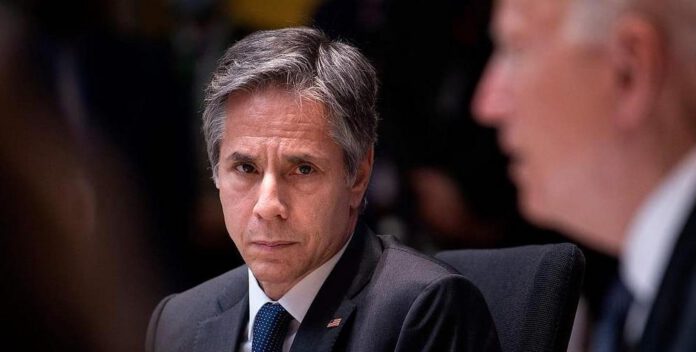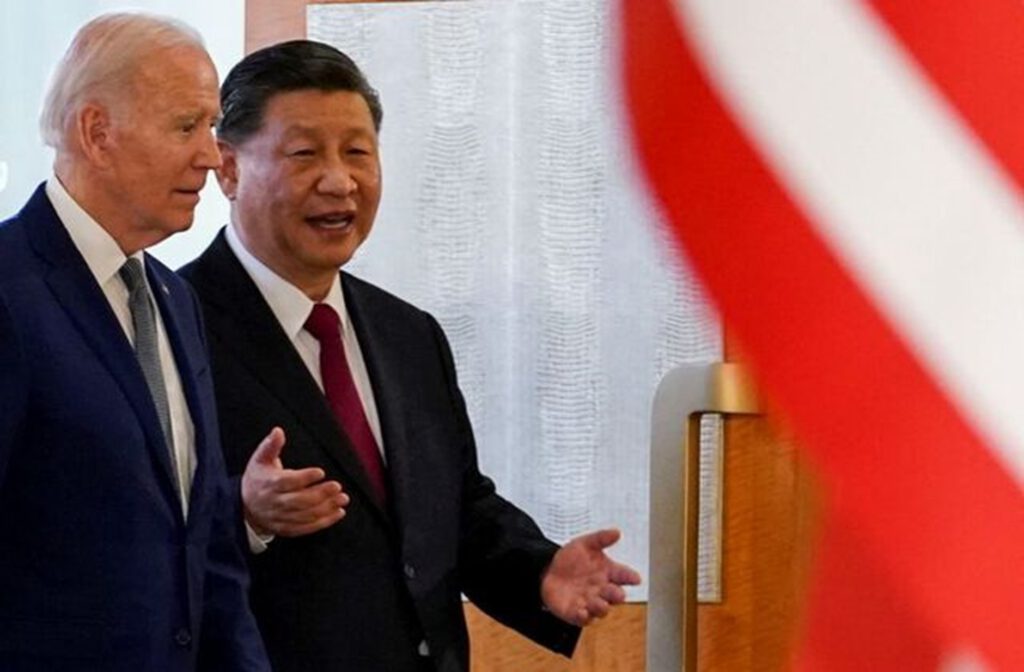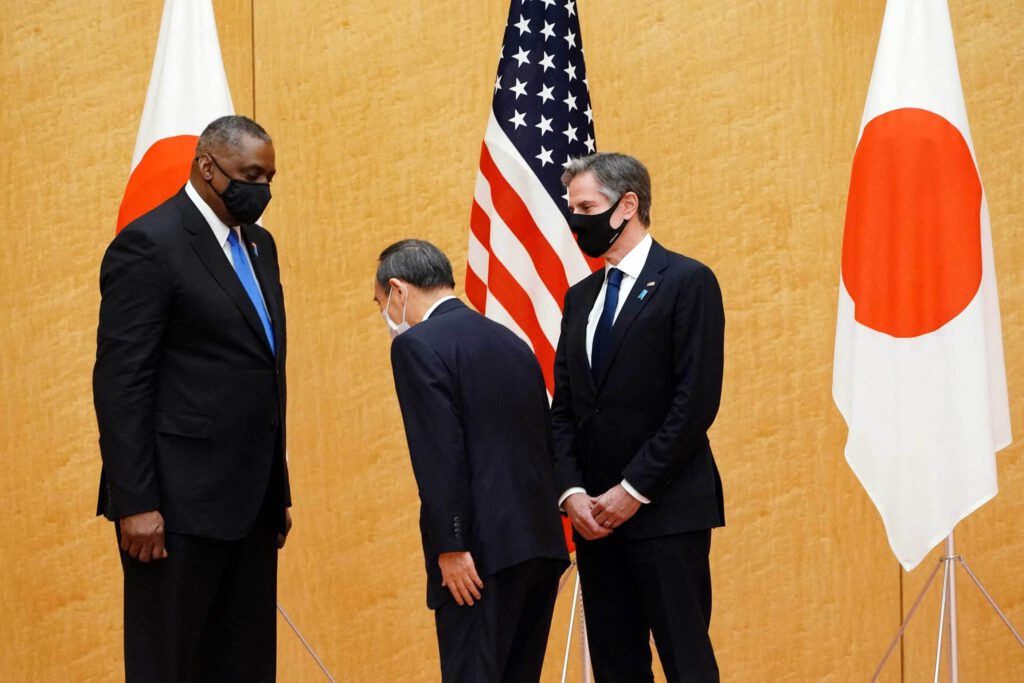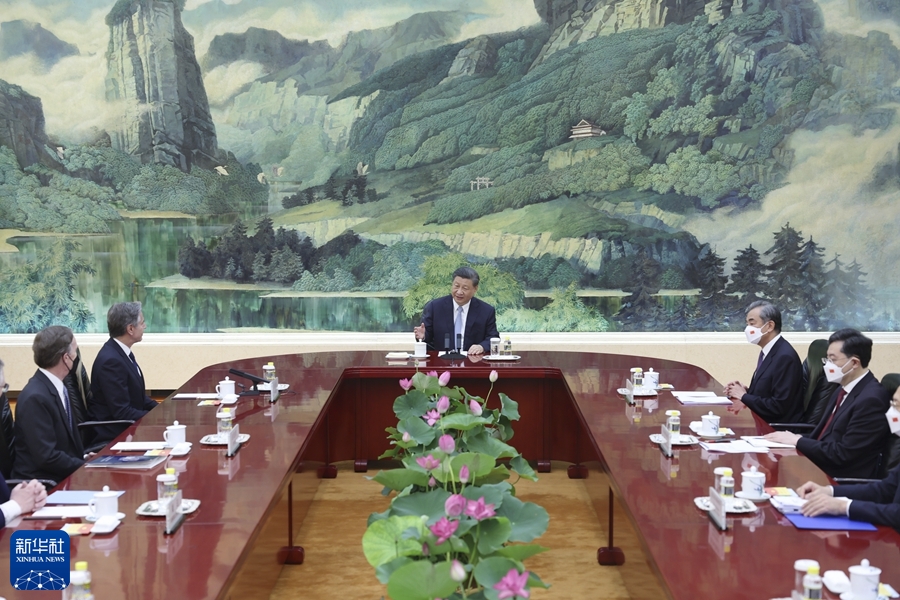
Secretary of State Antony John Blinken visited China, and on June 18, Chinese Foreign Minister Qin Gang held a 5.5 hour meeting with Blinken.
Before this meeting, Chinese Assistant Minister of Foreign Affairs, Foreign Ministry Spokesperson, Hua Chunying mentioned on her Twitter account that she hoped this meeting would push U.S.-China relations back to the framework of the consensus reached by the U.S.-China summit in Bali.
During the G-20 Leaders Summit in Bali in 2022, the commitments made by the U.S. and recognized by China is the important basis to maintain the U.S.-China relationship on a healthy track.
Among them, the U.S. side committed to “five noes” : not seek a “new Cold War”; not seek to change China’s system; the revitalization of its alliances is not against China; not support “Taiwan independence”; not look for conflict with China, and not go further down the wrong and dangerous path.
The Chinese side asked the U.S. side whether the two sides should establish new principles to guide the U.S.-China relationship in a new period of structural changes in their power and how to deal with a series of shocks and challenges, which can be continued by the two teams based on the existing consensus, to reach an early agreement.

As also mentioned in the Bali Summit communiqué, the two heads of state agreed:
First, to maintain strategic communication between the diplomatic teams and to conduct regular consultations. The two working teams should follow up on time to implement the important consensus reached by the two heads of state and take practical actions to promote the return of the U.S.-China relationship to a stable development track. Therefore, the current visit of Blinken to China was already determined at the Bali Summit but was delayed for more than six months in between.
Second, the financial teams of the two countries would conduct dialogue and consultation on macroeconomic policies, economic and trade issues, etc.
Third, work together to promote the success of the 27th Conference of the Parties to the United Nations Framework Convention on Climate Change, agreed to reach an agreement on cooperation between the two sides to carry out binational dialogue on public health, agriculture, and food security, agreed to use the U.S.-China Joint Working Group to promote the resolution of more specific issues, and agreed on the importance of China-U.S. humanities exchanges to encourage and expand personnel exchanges between the two countries in various fields.
This newly released Chinese briefing after the meeting with Blinken builds on the Bali Summit, is roughly divided into four parts and is very rich in expressed views.
The first part expresses China’s strategic view. China and the United States established diplomatic relations in 1979, and China considers that the current U.S.-China relationship may be worse than what history has experienced in 1989, 1995, 1996, 2001, and other years when there have been some sharp conflicts. But China’s attitude is that it does not seek conflict with the U.S., nor does it consider this a normal state of affairs. China does not believe that this is in the common interest of the two peoples, nor does it meet the expectations of the international community.
Next, China raised several hopes, which are criticisms of the U.S. side, pointing out that the U.S. side has not maintained the political foundation of Sino-U.S. relations. Also, the U.S. side doesn’t calmly, professionally and rationally handle accidental eventualities. “Rational handling” is a new term, as being irrational could lead to war, which both sides do not want to see.
China hopes that both sides implement the consensus of the Bali meeting. This is not the first time the Chinese side has raised this issue. During the phone call between President Xi and President Biden, China clearly expressed its hope that the U.S. side would put Mr. President’s commitment into practice. The President gave a promise, and if the team does not put it into practice, is the president’s promise insincere? Is it a dereliction of duty as the nation’s top leader if the team is not even under control?
The third part is on the Taiwan issue. Qin Gang pointed out that the Taiwan issue is at the core of China’s core interests and is the most significant issue and the most prominent risk in the U.S.-China relations. China values that the U.S. commitment not to support Taiwan’s independence be put into practice, and not to send wrong signals or make tentative or even substantive moves, which could lead to a shaking of the political foundation of the U.S.-China relations and have serious consequences.

Compared with the previous communiqué, this time the Chinese side has a very special part in the release, with five points of mutual agreement. The Chinese side tried to convey to the world that the U.S. and China have reached certain results.
The two sides agreed, first, to jointly implement the important consensus reached at the Bali meeting between the two heads of state, effectively manage differences, and promote dialogue, exchange, and cooperation.

Second, to maintain high-level contacts. Secretary Blinken invited State Councilor and Foreign Minister Qin Gang to visit the United States, and Qin Gang expressed his willingness to visit the United States at the convenience of both sides. To go when it is convenient for both sides, which is a subtle diplomatic language. When it undermines China’s core national interests and fails to deliver on its promises, it is a time of inconvenience. Especially given the mediocre performance of this U.S. administration on many fronts, a visit to the U.S. itself would score it diplomatic points, making it all the more necessary for the U.S., but there is no reason for China to go along with it. Goodwill should be mutual, depending on the U.S. side’s actions.
Third, both sides agreed to continue to move forward with consultations on guiding principles for U.S.-China relations. The consultations on guiding principles for the U.S.-China relations based on Bali talks become a new topic in the U.S.-China relations. Instead of discussing specific issues, discussing relatively macro and abstract guiding principles is essential for the healthy development of the U.S.-China relations in the new era. This time, Blinken visited China with very specific topics to press China, focusing on core values and U.S.-China competition, fentanyl cooperation, climate cooperation, etc. Foreign Minister Qin Gang’s strategy is very clear, only exploring macro issues, such as the issue of guiding principles, which relate to how to implement the consensus reached at the summit between the two heads of state and form an overall framework. As for specific issues, they are put to the working group level for discussion.

Finally, the briefing encouraged the expansion of humanities and education exchanges between the two countries and active discussions on increasing passenger flights between China and the United States. Many students, academics, and business people are welcome to visit each other’s countries, and support and facilitation are provided for this purpose. The U.S. side has currently added four new flights between China and the United States.
As the power structure of China and the United States changes, the way the Chinese and American people get along must also change. Negotiations will push the U.S.-China relationship forward in a direction that will benefit the fundamental interests of the Chinese and American people.
(Source: Ministry of Foreign Affairs of the People’s Republic of China, Reuters, USNews)



